Filter by
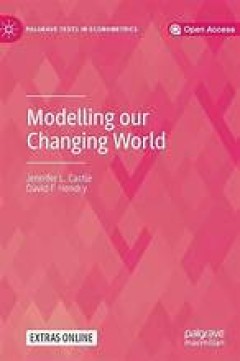
Modelling our Changing World
This open access book focuses on the concepts, tools and techniques needed to successfully model ever-changing time-series data. It emphasizes the need for general models to account for the complexities of the modern world and how these can be applied to a range of issues facing Earth, from modelling volcanic eruptions, carbon dioxide emissions and global temperatures, to modelling unemployment…
- Edition
- 1
- ISBN/ISSN
- 978-3-030-21432-6
- Collation
- -
- Series Title
- Palgrave Texts in Econometrics
- Call Number
- XIX, 128
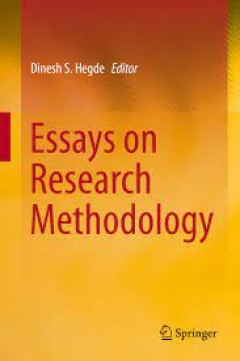
Essays on Research Methodology
The book presents a collection of essays addressing a perceived need for persistent and logical thinking, critical reasoning, rigor and relevance on the part of researchers pursuing their doctorates. Accordingly, eminent experts have come together to consider these significant aspects of the research process, which result in different knowledge claims in different fields or subject areas. An at…
- Edition
- 1st Edition
- ISBN/ISSN
- 978-81-322-2214-9
- Collation
- 43 b/w illustrations
- Series Title
- -
- Call Number
- -

In Search of the Two-Handed Economist Ideology, Methodology and Marketing in…
For the economics profession, issues of marketing and ideology have often been reduced to the status of 'the love that dare not speak its name'. This volume brings these issues out of the closet and examines what effect, if any, these factors have in shaping the contours of the discipline. The way in which economists face policy issues is in part driven, even if only subconsciously, by unacknow…
- Edition
- -
- ISBN/ISSN
- 978-1-137-58973-6
- Collation
- XX, 418
- Series Title
- -
- Call Number
- 330 FRE i

Frank H. Knight: Prophet of Freedom
This book argues for the reconsideration of Frank Knight and the Chicago School of Economic thought in a post-Financial Crisis world. The author posits that the discussion of the founder of "Knightian Uncertainty" can reveal new insights into what the economy can do for society, as his prophetic insights can offer a view into the soul of the modern economy. The book first considers Frank Knight…
- Edition
- -
- ISBN/ISSN
- 978-1-137-46211-4
- Collation
- X, 288 pages
- Series Title
- Great Thinkers in Economics
- Call Number
- -
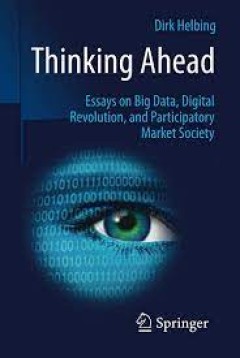
Thinking Ahead - Essays on Big Data, Digital Revolution, and Participatory Ma…
The rapidly progressing digital revolution is now touching the foundations of the governance of societal structures. Humans are on the verge of evolving from consumers to prosumers, and old, entrenched theories – in particular sociological and economic ones – are falling prey to these rapid developments. The original assumptions on which they are based are being questioned. Each year we pro…
- Edition
- -
- ISBN/ISSN
- 978-3-319-15078-9
- Collation
- -
- Series Title
- -
- Call Number
- -

The University According to Humboldt History, Policy, and Future Possibilities
This book discusses the philosophy and educational reforms initiated by Wilhelm von Humboldt as well as their legacy in the modern university system. It begins with a discussion of the history of the university from antiquity and the Middle Ages through the era of Humboldt’s reforms and its remnants in and implications for the present day. The authors then delve into policy, outlining the key…
- Edition
- -
- ISBN/ISSN
- 978-3-319-13856-5
- Collation
- -
- Series Title
- -
- Call Number
- -

The Theory of New Classical Macroeconomics A Positive Critique
This book examines new classical macroeconomics from a comparative and critical point of view that confronts the original texts and later comments as a first dimension of comparison. The second dimension appears in a historical context, since none of the new classical doctrines can be analyzed ignoring the parallelism and discrepancies with the theory of Keynes, Friedman or Phelps. Radicalism o…
- Edition
- -
- ISBN/ISSN
- 978-3-319-17578-2
- Collation
- -
- Series Title
- -
- Call Number
- -
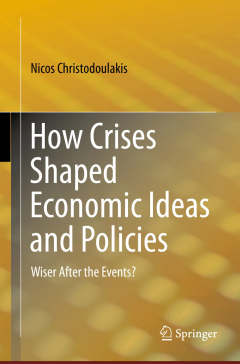
How Crises Shaped Economic Ideas and Policies: Wiser After the Events?
This book explores how successful the various tenets of economic thought have been in prognosticating or remedying economic crises. Examining key episodes in economic history, from famines in antiquity to present-day financial collapse, the author finds that several theories failed to cope with a crisis and lost their academic impact. The author also presents cases in which major theoretical in…
- Edition
- -
- ISBN/ISSN
- 978-3-319-16870-8
- Collation
- XIII, 222
- Series Title
- -
- Call Number
- 330 CHR h

Great Nations at Peril
This book was prompted by the current, lingering financial crisis, which has its basis in the disorderly financial practices of the United States. These practices have resulted in an accumulated debt which now requires the United States to run financial policies at artificially low interest rates. In principle, these low interest rates should flood the markets with ready money. Since the spread…
- Edition
- -
- ISBN/ISSN
- 978-3-319-10054-8
- Collation
- VII, 172
- Series Title
- -
- Call Number
- 330 GRE
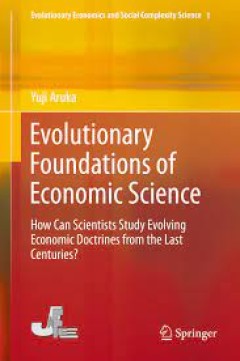
Evolutionary Foundations of Economic Science How Can Scientists Study Evolvi…
This book aims to discern and distinguish the essential features of basic economic theories and compare them with new theories that have arisen in recent years. The book focuses on seminal economic ideas and theories developed mainly in the 1930s to 1950s because their emergence eventually led to new branches of economics. The book describes an alternative analytical framework spreading through…
- Edition
- -
- ISBN/ISSN
- 978-4-431-54844-7
- Collation
- 78 b/w illustrations, 24 illustrations in colour
- Series Title
- -
- Call Number
- -
 Computer Science, Information & General Works
Computer Science, Information & General Works  Philosophy & Psychology
Philosophy & Psychology  Religion
Religion  Social Sciences
Social Sciences  Language
Language  Pure Science
Pure Science  Applied Sciences
Applied Sciences  Art & Recreation
Art & Recreation  Literature
Literature  History & Geography
History & Geography